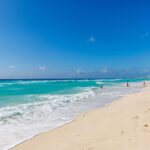
South Africa has seen its fair share of tough times, thanks to rabid colonization and slavery. The Dutch and English colonized the country in the mid-1600s and imported slaves from southern Asia and other parts of Africa. Though no longer ruled by either nation, their cultural imprint can be seen everywhere, from the full English breakfasts to the imports and readily available consumer brands. Still, however troubled its past may be, the country is one of the world's most beautiful and exotic places.
Referred to as the Rainbow Nation, South Africa is home to a mix of people. There are Afrikaners, who are descendants of the Dutch, and the Nguni group, which include Zulu, Xhosa, Ndebele, and Sazi people. Malays and Indians, among others, also help make up this diverse nation. This diversity also extends to the country's landscape. South Africa boasts eight distinct biomes, from the fynbos to the grassland, and serves up everything from gourmet meals, fine art, and wine tastings to hiking, surfing, and safaris. It's no wonder, then, that it made our list of top destinations to visit in 2017. But before you start packing your bags, check out our list of things to know when visiting the country. Below, we cover everything from safety precautions and what side of the road to drive on to which animals are going extinct and special phrases to help you get by.
1. The Cape of Good Hope is not Africa's southernmost point.
Contrary to what your tour brochure may say, the Cape of Good Hope, a rocky promontory at the southern end of the Cape Peninsula, is not the southernmost point of the continent. In fact, that title goes to Cape Agulhas, located approximately 109 miles southeast of Cape Town. Looks like you have a brand-new spot to scout out for selfies.
2. South Africa is a developed country.

In fact, you’ll find everything from paved roads and highways to gourmet restaurants, five-pearl hotels, farmers’ markets, museums, and malls here. And while it might be exhilarating to picture a plethora of wild animals roaming the streets, don’t expect to share the crosswalk with any lions, elephants, or giraffes. While some villages that border game reserves have to deal with the occasional predator stalking their cattle, you won’t spot any wild animals outside the safari.
3. Take proper safety precautions.
Safety is a major concern for first-time travelers to (and even some longtime lovers of) South Africa. High murder rates have earned the country a reputation as a dangerous destination. Although crime continues to be an issue, the majority of incidents occur in areas that aren’t typically frequented by tourists. That’s not to say tourists aren’t targets of petty crime. However, most travelers find that with proper preparations and precautions, these altercations can be avoided. Tips: don’t wear flashy jewelry, listen to your iPod, or play on your smartphone in public; don’t leave your bag on an empty chair or phone on the table at restaurants; and don’t walk around alone late at night.
4. You'll appreciate the exchange rate.
Things in South Africa are affordable for tourists on the U.S. dollar, euro, or pound. Local beers and ciders cost around a dollar or less, bottles of local wine can be had for approximately $20, and a three-course meal (with drinks) at an upscale restaurant can be enjoyed for around $40 per person. Upscale hotels in popular locations are a fraction of the cost of those in major U.S. cities. You can also grab cheap souvenirs, handmade home decor items, and copper jewelry for under 100 rand (around $7 USD).
Editor’s note: As of publishing this piece, $1 USD was equal to about 13 rand.
5. Budget big for safaris.

While most hotels are a great bargain, you’ll have to make sure you keep your budget big if you want to go on a safari. There are wallet-friendly camping options for the brave and budget-minded, but if you’re looking for a comfortable bed and knowledgeable guide, you’ll have to loosen the belt on your budget significantly (most reputable spots start around $400 in the off season). Think of it as an investment — you’re not only paying for a bed, but typically also meals, service, sighting opportunities, and an informed ranger.
6. Beware of accidentally supporting a bad cause or company.
Several parts of South Africa aren’t regulated. So, before you sign up for that township tour, animal experience, volunteer program, or even buy a bottle of local wine, do your research. Make sure you pick tour operators who give back to the local economy or specific causes. Be sure that your animal experience isn’t contributing to canned hunting or cruelty, check that your volunteer program isn’t exploiting people or wildlife, and know which larger companies, including wineries, are supportive of its workers and labor laws.
7. South Africa runs on its own time.

If you’ve been to the Caribbean or Southeast Asia, you are aware of how the concept of time can shift. This laid-back, slow pace is also found in South Africa. You might find yourself anxiously tapping your feet for that waiter to come by or hotel clerk to check you in, even in big cities like Johannesburg and Cape Town. Remember that it’s not a slight or laziness, but just the wonderfully slow South African way. Embrace it — you’ll be back home and rushing around before you know it.
8. Cell phone coverage areas are on point.
Worried that your trip to South Africa means you’ll be unplugged from friends and family back home? Don’t be. The coverage in South Africa is vast. However, it’s important to note that all but one network still operates on 3G and, if you get a local SIM, data plans and minutes are often capped, though incoming calls are free.
9. Take Uber and follow these tips if you're renting a car.
We recommend using Uber instead of cabs, which often don’t have meters and overcharge tourists. Solo female travelers need to be especially aware and never travel alone at night. If you’re renting a car, get full insurance protection, keep nothing of value in the vehicle (or toss it in the trunk, if you must), avoid going off the beaten track, and be vigilant of speed demons. And remember, they drive on the left.
10. Locals have differing opinions on Nelson Mandela.

Depending on who you speak to, Nelson Mandela is either a hero or a terrorist — or both. Many countries celebrate Mandela as a revolutionary who helped overthrow apartheid and became the first black and democratically-elected president in the country. However, others view his acts of political protest against institutionalized racism in tandem with his multi-racial and communist friendships as acts of terror against the apartheid state. In 1952, he was arrested and began a 27-year imprisonment. Talking politics here is probably a poor choice, especially since the wounds from the apartheid are still healing.
11. Elephants are not endangered in South Africa.
It’s true that other African countries are dealing with elephant poachers and declining numbers of the animal, but South Africa actually has a hearty population of this gentle giant. In fact, controlling the large elephant population is a hot conservation debate, as some game reserves cull herds to keep populations down. And while it seems like an obvious solution to ship extra elephants to places losing their population, shipping is too costly, and therefore, not a viable option.
12. The same goes for giraffes.
“Smithsonian Magazine” recently published a piece, remarking that the giraffe was silently slipping onto the endangered list. While the animals are currently on the threatened list in East, West, and Central Africa — a result of poaching and habitat loss — South Africa’s giraffe population is climbing. In 2010, there were an estimated 12,000 giraffes in the wild. By 2016, that number grew nearly three times.
13. You're going to want to tip that car guard.

Don’t be alarmed if you encounter someone in a bright yellow or orange vest saying that you owe them money while you’re parking the car. These individuals are car guards and are there to watch your vehicle and protect it from break-ins while you’re away. If you refuse, the car guard may actually damage your car in retaliation. So, for a few rand (we’re talking two to five rand for a few minutes or 10 rand for longer absences), it’s worth it. With that in mind, make sure to keep change on you.
Vital Vocabulary
You can’t have 11 official languages without creating a bit of your own country-specific vocabulary. While you can have a successful trip without learning any these colloquialisms and references, reading up on them will certainly make your visit a little less confusing (and possibly less offensive).
just now – You might think this means right now, but it actually means an undetermined amount of time. That being said, if someone tells you they will pick you up just now, don’t rush.
now now – This repetitive phrase can either mean right now or as soon as possible.
lekker – Coming from Afrikaans, this word is the equivalent of awesome, great, and good.
shame! – While it can be taken to mean ‘shame on you’ by some travelers, this actually translates to ‘that’s a shame.’
is it? – This phrase is an exclamation more than a question, and is the same as following up a surprising bit of news with ‘really?’
robot – Definitely learn this one in case you need directions. It means stoplight.
zebra crossing – It doesn’t take a stretch of the imagination to see why they refer to black-and-white striped crosswalks as zebra crossings.
You’ll Also Like:
- Endless Summer Spotlight: Cape Town, South Africa
- 5 Wildlife Adventures You Have to Take Before You Die
- 8 Things I Learned the Hard Way on Safari
- 5 Ways to Have the Best Safari Experience Ever
All products are independently selected by our writers and editors. If you buy something through our links, Oyster may earn an affiliate commission.



